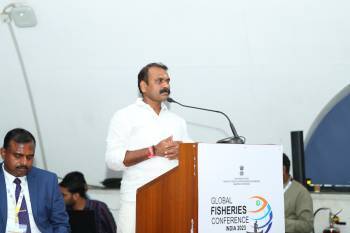AHMEDABAD, 22 November 2023: In a significant move to boost India’s fisheries production, Dr L Murugan, Minister of State for Fisheries, Animal Husbandry and Dairying, Govt of India, has affirmed the Central government’s unwavering commitment to support traditional fishermen in their transition to deep-sea fishing.
This support will be extended through the schemes namely, the Blue Revolution and the Pradhan Mantri Matsya Sampada Yojana (PMMSY).
He was speaking at a technical session on ‘Deep Sea Fishing: Technology, Resources, and Economics’ at the Global Fisheries Conference India 2023 in Gujarat Science City, Ahmedabad.
“The government is providing up to 60% financial assistance to traditional fishermen to convert their vessels into deep-sea fishing boats. Additionally, loan facilities are also available to facilitate this transformation”, the Minister said.
Dr Murugan emphasised the need for modern fishing vessels equipped with in-built processing facilities to maintain international quality standards for deep sea resources like tuna. Acknowledging that traditional fishermen currently lack these capabilities, the Minister ensured that the government is committed to address this gap.
“Tuna fishes are in high demand worldwide, and India has the potential to increase its tuna fishing capacity. However, we need technological advancements in this area”, he said.
Dr Murugan called for more start-ups to enter the deep-sea fishing sector and for research to focus on reducing fuel costs and exploring the use of green fuels in fishing boats.
“There is a need for research and design in upgrading fishing vessels to effectively harness the potential of deep-sea fishing in a sustainable way”, the Minister added.
Deep sea fishing is undertaken beyond the limit of territorial waters, which is 12 nautical miles from the shore, and within the Exclusive Economic Zone (EEZ) of 200 nautical miles from the shore.
Highlighting the high value of the deep sea resources, Dr Sanjay Pandey, Deputy Commissioner of Fisheries, Govt of India said that Indian Ocean yellowfin tuna has an end value of more than 4 billion US dollar.
Dr Arthur Neiland, World Bank Consultant, the UK said despite the promising potential of yellowfin and skipjack tunas in India's EEZ, with an estimated harvest of 179,000 tonnes, the actual harvest is a mere 25,259 tonnes, indicating a utilization rate of only 12%.
He emphasised the need for investment from the public and private sector in deep sea fishing which could generate economic, social and environmental benefits. “Utilising India’s strong institutional base, with expertise in fisheries science and management, fish processing and infrastructure will also be beneficial for the deep-sea fishing development plans”, Dr Neiland said. Enabling an environment to encourage stakeholder participation and investment, technology and expertise and regional and international collaborations and partnerships is equally important, he added.
Shedding light on the advanced technologies in information dissemination system, Dr Nilesh M Desai, Director of Space Application Centre (SAC) of the ISRO said communication and information system plays a major role in the livelihood of the fishermen as it helps to protect their lives at sea, track their locations, plan their fishing trips and find the fish availability areas. “The SAC possesses the capability to detect and alert stakeholders whenever cyclones begin to form in the ocean”, he said.
Dr Amparo Perez Roda, Fisheries Officer of the Food and Agriculture Organisation (FAO) spoke on the voluntary guidelines on the marking of fish gear in deep sea fishing.
A panel discussion, held on this theme, proposed that collective and inclusive efforts addressing the concerns of all the stakeholders are necessary to develop a systematic framework for the development of deep sea fishing. Dr Manell Zakharia.. Deep sea consultant, NIOT, Chennai, Dr Prashant Kumar Srivastava, Scientist-G MoES, Dr P Shinoj, Senior Scientist of ICAR-Central Marine Fisheries Research Institute (CMFRI) and Dr Hashim, Scientist D of CMLRE were the panellists.
By Jagdish Kumar




















